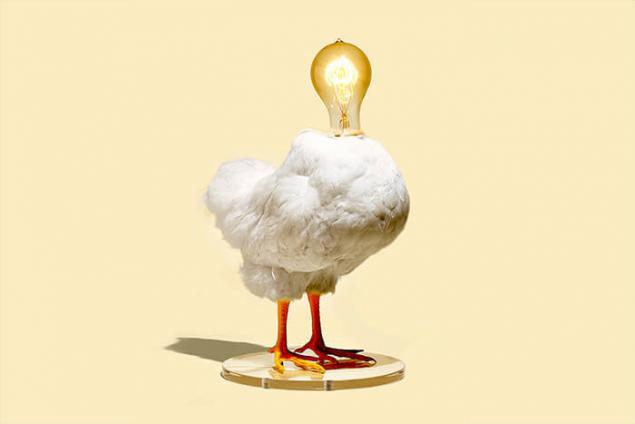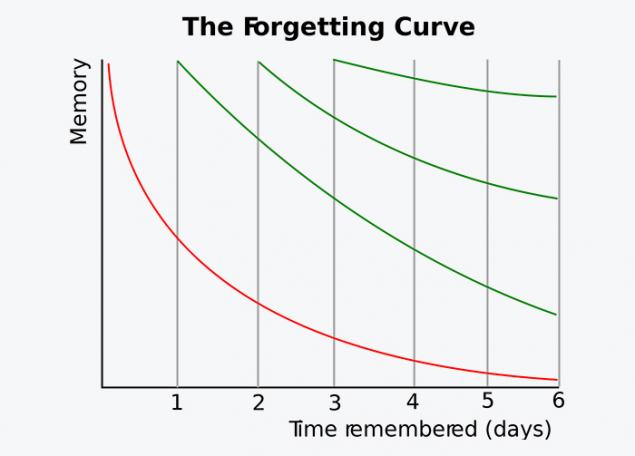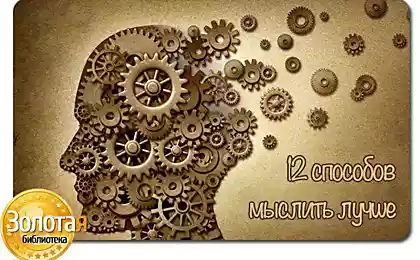480
How to memorize important information
Memorizing several approaches In the late nineteenth century the German psychologist Hermann Ebbinghaus built the curve of forgetting, showing how long is stored in memory once stored information. Ebbinghaus suggested subjects to memorize the three-letter senseless syllables. When rote memorization, that is when a person does not understand the meaning of the material and does not apply mnemotechnic in an hour the memory is still only 44% of the information a week later — less than 25%. Fortunately, with the informed memorizing information is forgotten much more slowly.
Most of the information is forgotten in the first hours after learning. What to do with it? Further experiments showed that the repetition of memorized material, the rate of forgetting decreases. The more repetitions, the stronger the stored information. From experiments to determine the speed of forgetting can draw practical conclusions. One of them is that practice to memorize anything for a time effective. Remember extensive information better in a few approaches, providing time for repetition.

© Bobby Doherty
If memorization is given one day, the optimal mode of repetitions is the following:
the first 15-20 minutes after learning;
second — after 6-8 hours;
the third in 24 hours.

To repeat information more actively: not to read or listen to the second time, and try to draw from memory and peeking at the source. If you happen to select to store information longer, apply it as follows:
for the first time — a day of learning;
second — on the fourth day;
the third to seventh day.
If the information is great, it is better to repeat with different level of detail. For the first time — in full, and the second key points, in third the whole volume of information to another group or in a different order. The more thoroughly you revise, the stronger note.
Threefold repetition — a necessary minimum. When the scout-illegal immigrant learns the legend, he repeats it hundreds of times and then regularly returns to her refreshing memory. Because it affects his life.
The edge effect
This pattern memory holds in the intelligence really special place. To test it, try a little experiment. Quickly, without training, read:
fireworks; function; orange; doctor; car; magazine; watch; editorial; sofa; skyscraper; a panel; a meteorite.
Close the list and try to remember the words of him. Check out for yourself. Most likely, one of the memorable words will be "fireworks" and "meteorite". Words from the middle of the list will be harder and recall errors. So, it is best to remember the beginning and the end. The edge effect works not only on lists. When you try to remember the events of the day, most clearly seen morning and evening. At the exam the students dream to pull the first ticket. When memorizing legend hardest given its chronological middle.
As already mentioned, the edge effect is widely used in exploration. With it, you can disguise your interest in a topic. It does not speak about what really interests you, at the beginning and the end of the conversation. Start with abstract topics. In the middle inform or ask what you need. At the end of the conversation talk about something else.
The edge effect does not always work. If you are affected by extremely painful for a human subject, he will remember it anyway, even if you raise it in the middle of a conversation. Well, that is the art of the scout to know the sick people and places around them. Ask a question otherwise. For example, create the impression of narrow-minded, tactless person, mentioning the uncomfortable topic of ignorance or thoughtlessness. In this case, the source will remember your awkward faux pas, which pushed into the background the essence of your question.
Interference
The essence of the interference is that similar memories are mixed. Two similar memories like affect each other, and the more they look, the harder they reliably remember. Not only does this new information makes it difficult to recall the old, but, on the contrary, often prevents the reproduction of old new.
For example, you are in for several years, using a Bank card and perfectly remember her pin. At the expiration of the Bank card reissued it. At first, each time the ATM in your memory will automatically emerge the old pin and take a conscious effort to remember the new one. But after a while the habit of change: the new pin will automatically remember and with stress. Similar memories associated with the same situation, interfere with each other.
To reduce the negative impact of interference, you can post remembering similar data over time. For example, when preparing for the exam, try to learn the material in such manner to each other followed as much as possible unlike questions. If you need to read a large number of documents, even if every other possibility different from the previous one. This rule holds true in many cases: change of activity saves power. If during the day you need to edit the document to write a review and draw a diagram, working with text, editing, and reviewing it is better to separate from each other drawing.
On the contrary, if you want your interlocutor forgot something, restart it a lot of information on a similar topic. Ask for his opinion, to discuss in detail the details, let it imbued with what was said. As a result of this stunt in memory of the interlocutor will be confusion, and thanks to interference, he can not clearly remember what he, in your opinion, should be forgotten. At least your friend will start to flounder and lose confidence.
When in conversation with you someone tries to remember something, and you want to stop, start... prompt. Wrong, but close to the truth tips would interfere with the recall of all create the same interference. This technique is used by lawyers, confusing witnesses during trial.
In everyday life you can observe a similar phenomenon when friends or family try to help you to remember anything, but their tips only complicate the matter.
From the book by Denis Bukin "memory Development in methods of intelligence services" published
P. S. And remember, just changing your mind — together we change the world! © Join us at Facebook , Vkontakte, Odnoklassniki
Source: theoryandpractice.ru/posts/10351-krivaya-zabyvaniya
Most of the information is forgotten in the first hours after learning. What to do with it? Further experiments showed that the repetition of memorized material, the rate of forgetting decreases. The more repetitions, the stronger the stored information. From experiments to determine the speed of forgetting can draw practical conclusions. One of them is that practice to memorize anything for a time effective. Remember extensive information better in a few approaches, providing time for repetition.

© Bobby Doherty
If memorization is given one day, the optimal mode of repetitions is the following:
the first 15-20 minutes after learning;
second — after 6-8 hours;
the third in 24 hours.

To repeat information more actively: not to read or listen to the second time, and try to draw from memory and peeking at the source. If you happen to select to store information longer, apply it as follows:
for the first time — a day of learning;
second — on the fourth day;
the third to seventh day.
If the information is great, it is better to repeat with different level of detail. For the first time — in full, and the second key points, in third the whole volume of information to another group or in a different order. The more thoroughly you revise, the stronger note.
Threefold repetition — a necessary minimum. When the scout-illegal immigrant learns the legend, he repeats it hundreds of times and then regularly returns to her refreshing memory. Because it affects his life.
The edge effect
This pattern memory holds in the intelligence really special place. To test it, try a little experiment. Quickly, without training, read:
fireworks; function; orange; doctor; car; magazine; watch; editorial; sofa; skyscraper; a panel; a meteorite.
Close the list and try to remember the words of him. Check out for yourself. Most likely, one of the memorable words will be "fireworks" and "meteorite". Words from the middle of the list will be harder and recall errors. So, it is best to remember the beginning and the end. The edge effect works not only on lists. When you try to remember the events of the day, most clearly seen morning and evening. At the exam the students dream to pull the first ticket. When memorizing legend hardest given its chronological middle.
As already mentioned, the edge effect is widely used in exploration. With it, you can disguise your interest in a topic. It does not speak about what really interests you, at the beginning and the end of the conversation. Start with abstract topics. In the middle inform or ask what you need. At the end of the conversation talk about something else.
The edge effect does not always work. If you are affected by extremely painful for a human subject, he will remember it anyway, even if you raise it in the middle of a conversation. Well, that is the art of the scout to know the sick people and places around them. Ask a question otherwise. For example, create the impression of narrow-minded, tactless person, mentioning the uncomfortable topic of ignorance or thoughtlessness. In this case, the source will remember your awkward faux pas, which pushed into the background the essence of your question.
Interference
The essence of the interference is that similar memories are mixed. Two similar memories like affect each other, and the more they look, the harder they reliably remember. Not only does this new information makes it difficult to recall the old, but, on the contrary, often prevents the reproduction of old new.
For example, you are in for several years, using a Bank card and perfectly remember her pin. At the expiration of the Bank card reissued it. At first, each time the ATM in your memory will automatically emerge the old pin and take a conscious effort to remember the new one. But after a while the habit of change: the new pin will automatically remember and with stress. Similar memories associated with the same situation, interfere with each other.
To reduce the negative impact of interference, you can post remembering similar data over time. For example, when preparing for the exam, try to learn the material in such manner to each other followed as much as possible unlike questions. If you need to read a large number of documents, even if every other possibility different from the previous one. This rule holds true in many cases: change of activity saves power. If during the day you need to edit the document to write a review and draw a diagram, working with text, editing, and reviewing it is better to separate from each other drawing.
On the contrary, if you want your interlocutor forgot something, restart it a lot of information on a similar topic. Ask for his opinion, to discuss in detail the details, let it imbued with what was said. As a result of this stunt in memory of the interlocutor will be confusion, and thanks to interference, he can not clearly remember what he, in your opinion, should be forgotten. At least your friend will start to flounder and lose confidence.
When in conversation with you someone tries to remember something, and you want to stop, start... prompt. Wrong, but close to the truth tips would interfere with the recall of all create the same interference. This technique is used by lawyers, confusing witnesses during trial.
In everyday life you can observe a similar phenomenon when friends or family try to help you to remember anything, but their tips only complicate the matter.
From the book by Denis Bukin "memory Development in methods of intelligence services" published
P. S. And remember, just changing your mind — together we change the world! © Join us at Facebook , Vkontakte, Odnoklassniki
Source: theoryandpractice.ru/posts/10351-krivaya-zabyvaniya
























